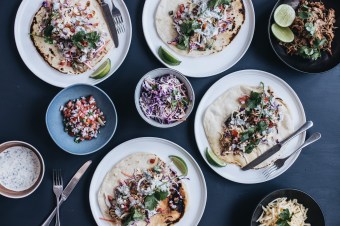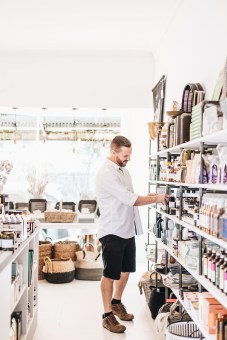
Birch owner Renée Wallace. Source: supplied.
COVID-19 brought about many changes for operators in the hospitality industry, and the Birch Restaurant was no exception.
Located in Moss Vale in the southern highlands of New South Wales, it’s situated about an hour and a half south of Sydney, an hour and a half north of Canberra, and a mere 800 metres away from its newly-arrived sister, the Birch Store.
Birch’s eight-person team — three of whom joined the business during lockdown — work across the restaurant, the store and events hosted by the business, taking care of services that range from dine-in meals to takeaway or make-at-home feasts and regional ‘takeover’ festivals.
Many of these services didn’t actually exist before the pandemic, but as owner and ‘lead trombone’ Renée Wallace tells SmartCompany Plus, “we thought if we could find things that people supported that also fulfilled our passions, it’d be a whole lot more fun.”
Here’s how the hospitality business is tackling the challenges of reopening alongside its lockdown-introduced offerings.
Key takeaways
Being first doesn’t necessarily mean being best
Businesses can take back control of the lockdowns
You don’t have to stay locked in to your initial business offering
It’s important to try and see hurdles as opportunities
A waiting game
Freedom day hit NSW on Monday, October 11, but Birch Restaurant didn’t open its doors to dine-in patrons — and it won’t, until October 28.
The store will stay open from Thursday to Sunday and its takeaway service will continue across the same days, as they seamlessly have throughout the whole lockdown, Wallace says. But the controversial decision not to reopen the restaurant as soon as they could was largely driven by hindsight.
“Last year, when everything really opened up, that first weekend back was just horrendous,” Wallace says.
“People weren’t clear on what they wanted to do; how they needed to do things; they didn’t understand capacities. It was really, really difficult to manage.
“So we decided last year to wait a week to just let everyone settle down and get their little outings out of their system.”
Wallace says it was a relief to have that extra time, and it meant when patrons did return, everyone knew what was what, and what was required of them. That’s what Birch expects will happen this time around, too.
At the same time, Wallace says another big reason they’re delaying the reopening is because the business’ lockdown trade has been “so hectic”.
The new store opened in lockdown, diversifying the business’ offerings; takeaway has quadrupled compared to 2020’s volumes; and, after re-opening its booking portal last week, the restaurant is already at full capacity until the rest of the year.
“We knew we wouldn’t get a chance until next year, so we really just wanted to take a break.”
The first wave
Last year, when the business was told it would have to close the following day due to a lockdown, the “pretty stubborn crew” knew there was no chance they were just going to shut their doors.
“There was no way not forward,” Wallace says.
“We just had to figure out what that path looked like.”
The path turned out to be pivoting its menu to suit takeaway meals and a new, in-house range of Birch products, where customers could buy sauces, condiments or garnishes they loved from the restaurant.

Birch revamped its fine dining offerings to suit takeaway options. Source: supplied.
“It was just insane,” Wallace says of the booming popularity for its new offerings.
“We naively thought that once everyone could get back out there and do things, they’re not going to want takeaway anymore; they won’t want our sauces in a jar.”
“But we were very wrong.”
Wallace believes a lot of the business pandemic growth came down to the fact that Birch was always “really clear” to its customers with what it was doing, when it was open, and what was changing.
“We had a really great taste that people’s dependence on us heightened, because they knew we were reliable”.
This time around, the team is coming back with that same mentality: delaying the reopening of the restaurant itself until they can do so confidently.
A balancing act
Wallace says the team has always known that once the restaurant was back to capacity, the capability of doing all of its other services inside the restaurant space was not possible.
“So we either had to make a really tough call and end [these offerings], or find a new way to continue it.”
It made the most sense to continue, Wallace says, because it felt like the business was then spreading its eggs into different baskets, providing a diversification that allowed Birch to move away from the “traditional restaurant model”.
Luckily, the space down the road became available, and the Birch Store now exists as its own entity, with around 175 products. About 30 of these are Birch-made, and the team also collaborates with other local businesses to create product ranges or source products to sell.

The Birch Store is located down the road from the Birch Restaurant. Source: supplied.
Ultimately, diversifying and doing more of the things the Birch team loved to do “just made sense”.
After all, it’s this diversification that will allow the business the ability to close the doors to its restaurant and relocate its crew to Orange for a 10-day, cross-regional event.
“It gives us the ability to keep trying to find those opportunities.”
Needless to say, the more it’s services grow, the more the eight-person team will need to as well. Wallace laughs, saying hiring new staff is definitely the problem at the moment.
But ‘putting its eggs in different baskets’ is what’s providing Birch with the security to employ more staff, Wallace explains.
“It gives us a really great growth potential.”
“See hurdles as opportunities”
Wallace knows it would be ignorant to assume the reopening guidelines won’t change, and there won’t be setbacks to businesses across the country as the vaccine rollout continues. But the way the Birch business has been redesigned has “proved itself” through this past lockdown with the demand for its store and takeaway.
Having these models in play means the business knows it can continue without interruption even while restrictions and requirements change across the state.
So what’s Wallace’s advice to other businesses navigating the reopening roadmap?
“Be greedy,” she says.
“I really believe that if you are authentic and have maintained relevance with your target markets, you will have the respect to operate in the way that you want to.”
Wallace says business owners should think about what they are wanting, and what they are comfortable doing — even if it’s different to their pre-pandemic services.
For Birch, taking some control back from the restrictions — such as by reopening on their own timeline, not the government’s — has enabled the team to be more comfortable with what they’re doing, how they are doing it, and the expectations that they have for customers.
“So have the courage to do that,” Wallace tells other businesses.
“Be brave enough to change how you trade, how people access your products or services; how and when you operate… whatever it might be.”
“I really think people can see hurdles as opportunities.”


COMMENTS
SmartCompany is committed to hosting lively discussions. Help us keep the conversation useful, interesting and welcoming. We aim to publish comments quickly in the interest of promoting robust conversation, but we’re a small team and we deploy filters to protect against legal risk. Occasionally your comment may be held up while it is being reviewed, but we’re working as fast as we can to keep the conversation rolling.
The SmartCompany comment section is members-only content. Please subscribe to leave a comment.
The SmartCompany comment section is members-only content. Please login to leave a comment.